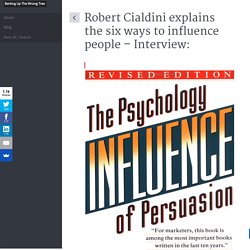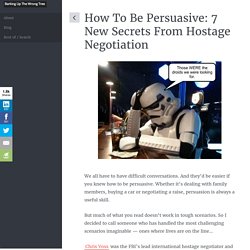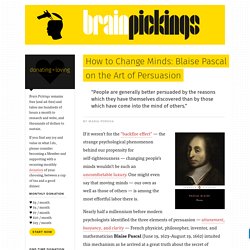

Smile, nod, and move on to more important things.nLife is short. Not caring about having the last word will save you so much time." James Clear. Science Of Persuasion. Dan Pink on Persuasion [RSA Short] Robert Cialdini explains the six ways to influence people - Interview: Dr.

Robert Cialdini Dr. Robert Cialdini is the authority on the study of persuasion. His classic book, “Influence” has sold millions of copies and is widely regarded as the go-to text on the subject. What makes the book so special is it’s not just a collection of academic studies on college students. Bob went “undercover” to learn the secrets of used car salesmen, marketing professionals, telemarketers, and others who influence in order to survive. He distilled his findings down to six universal principles of influence which anyone can use in their daily life. His company, Influence at Work, offers workshops that teach the principles to business professionals. I spoke with Bob about the six pillars of influence, the ethics of persuasion, and the best way to ask for a raise. My conversation with Bob was almost an hour long, so for brevity’s sake I’m only going to post edited highlights here.
If you want the extended interview I’ll be sending it out with my weekly newsletter on Sunday. 4 Tips for Dealing With Stubborn People. Have you ever offered perfectly good advice to a loved one and been baffled as to why it fell on deaf ears?

I have. When the best course of action is clear and yet remains ignored by the person who most needs that knowledge, what’s going on? This week I had the privilege of reading the transcript of a recent address by psychoanalyst Elio Frattaroli, author of one of my favorite books, Healing the Soul in the Age of the Brain. In it, Dr. Frattaroli reviews the four therapeutic principles of Bruno Bettelheim, one of his early mentors. I was struck by how effectively these precepts can be applied in our own lives — for example, in dealing with “resistant” loved ones who refuse to take good advice… or anyone else who seems to be behaving irrationally. 1. If we start with the assumption that the person doesn’t know what’s best for them, we’re going to convey that lack of faith. 2. 3. 4. Compliance.
Judgment. Authority. How to Persuade Twice As Many People in 3 Seconds. How To Be Persuasive: 7 New Secrets From Hostage Negotiation. We all have to have difficult conversations.

And they’d be easier if you knew how to be persuasive. Whether it’s dealing with family members, buying a car or negotiating a raise, persuasion is always a useful skill. But much of what you read doesn’t work in tough scenarios. So I decided to call someone who has handled the most challenging scenarios imaginable — ones where lives are on the line… Chris Voss was the FBI’s lead international hostage negotiator and he’s the author of an excellent new book: “Never Split The Difference.”
Think you know what really influences people? Chris focuses on emotions. Let’s get to it… 1) Don’t Be Direct Straightforward and honest are good qualities. Skipping listening, empathy, and rapport is what turns an easily resolved dilemma into a fight. Don’t think, “I’m a very direct and honest person. “Cutting to the chase” can feel like an attack. (For more FBI behavioral techniques on how to get people to like you, click here.)
NYPD Hostage Negotiators On How To Persuade People: 4 New Secrets. I’m pretty sure I just heard a gunshot.

And that means she’s dead. Hold on, I guess I better back up and explain… How to Change Minds: Blaise Pascal on the Art of Persuasion. If it weren’t for the “backfire effect” — the strange psychological phenomenon behind our propensity for self-righteousness — changing people’s minds wouldn’t be such an uncomfortable luxury.

One might even say that moving minds — our own as well as those of others — is among the most effortful labor there is. Nearly half a millennium before modern psychologists identified the three elements of persuasion — attunement, buoyancy, and clarity — French physicist, philosopher, inventor, and mathematician Blaise Pascal (June 19, 1623–August 19, 1662) intuited this mechanism as he arrived at a great truth about the secret of persuasion: Pascal came to see that the surest way of defeating the erroneous views of others is not by bombarding the bastion of their self-righteousness but by slipping in through the backdoor of their beliefs.
Long before we invented psychology and learned to apply it in reverse, Pascal adds: The Scientific Way to Win an Argument. How to win an argument. Sophist. False Memory. Dysfunctional Behaviors.